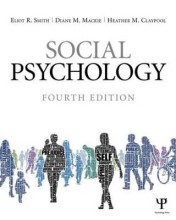Samenvatting: Social Psychology | 9781848728943
- Deze + 400k samenvattingen
- Een unieke studie- en oefentool
- Nooit meer iets twee keer studeren
- Haal de cijfers waar je op hoopt
- 100% zeker alles onthouden
Lees hier de samenvatting en de meest belangrijke oefenvragen van Social Psychology | 9781848728943
-
0 Preface
Dit is een preview. Er zijn 3 andere flashcards beschikbaar voor hoofdstuk 0
Laat hier meer flashcards zien -
Wat zijn de 8 basisprincipes van sociaal gedrag?
- Wij construeren onze eigen werkelijkheid
- De sociale invloed is alom vertegenwoordigd
- Motivationeel principe #1: mensen streven ernaar zichzelf en de wereld beter te begrijpen
- Motivationeel principe #2: mensen streven naar verbondenheid
- Motivationeel principe #3: mensen streven naar een positief beeld over onszelf en over onze groep
- Informatie verwerkingsprincipe #1: conservatisme (vasthouden aan oude ideeën)
- Informatie verwerkingsprincipe #2: toegang (makkelijk toegankelijke informatie heeft het meeste invloed)
- Informatie verwerkingsprincipe #3: diepte van verwerken (mensen switchen tussen oppervlakkige en diepgaande informatieverwerking
- Wij construeren onze eigen werkelijkheid
-
Het is bijvoorbeeld goed om te weten dat de Correspondence bias hetzelfde is als de fundamentele attributiefout. Verder krijg je vragen over hoe personen reageren in bepaalde situaties. Ik zat dan wazig naar het scherm te staren en vroeg me af hoe ik dat moest voorspellen terwijl ik niets wist over het karakter en de omstandigheden van de persoon in kwestie.
Dan is het handig je te realiseren dat het niet gaat om de reactie van deze specifieke persoon maar om hoe de meerderheid van personen zou reageren of de gemiddelde persoon. -
0.1.2 Hoofdstuk 3; Waarnemen Individuen
Dit is een preview. Er zijn 30 andere flashcards beschikbaar voor hoofdstuk 0.1.2
Laat hier meer flashcards zien -
3.3.2 Wat is de perserverance bias?
De neiging dat informatie een blijvend effect heeft op ons oordeel, zelfs nadat deze in diskrediet is gebracht -
0.1.3 Hoofdstuk 4
Dit is een preview. Er zijn 83 andere flashcards beschikbaar voor hoofdstuk 0.1.3
Laat hier meer flashcards zien -
Actor–observer verschillen in attributie
De tendentie om ons eigen gedrag aan situationele oorzaken te attribueren, terwijl we andermans gedrag toeschrijven aan innerlijke karaktereigenschappen -
Externe beloningen ondermijnen de
Intrinsieke motivatie.
(Mark Lepper demonstreerde dit met kinderen en kleuren; kinderen met vooraf beloofde certificaat 'Good Player' lieten later een verlaagde motivatie zien, tegenover de kinderen die geen of onverwachts een certificaat kregen.) -
denken aan werkelijk of ingebeeld gedrag verhoogd de toegankelijkheid van
Gerelateerde persoonlijke karakteristieken.
(dit kan zelfs je daadwerkelijke prestaties verbeteren) -
De reacties van anderen hebben het grootste effect op het zelfconcept wanneer mensen;
- Onzeker zijn
- Zelfconcept nog in ontwikkeling is ( kinderen )
-
Een effect van een vergelijkingsstandaard of prime waardoor het oordeel van de waarnemer meer op de standaard lijkt
Assimilatie Effect -
0.1.5 Hoofdstuk 6
Dit is een preview. Er zijn 10 andere flashcards beschikbaar voor hoofdstuk 0.1.5
Laat hier meer flashcards zien -
Moral exclusion (uitsluiten)
Geloven in de morele superioriteit van de ingroep. Outgroep wordt gezien als niet menselijk -
0.1.6 Hoofdstuk 7
Dit is een preview. Er zijn 16 andere flashcards beschikbaar voor hoofdstuk 0.1.6
Laat hier meer flashcards zien -
Sociale identiteit functie
De manier waarop een attitude bijdraagt aan verbondenheid door belangrijke zelf/groepsidentiteiten en functies te benadrukken
- Hogere cijfers + sneller leren
- Niets twee keer studeren
- 100% zeker alles onthouden
Onderwerpen gerelateerd aan Samenvatting: Social Psychology
-
Universele principes van sociaal gedrag
-
What is Social Psychology? - A Defintion of Social Psychology
-
What is Social Psychology? - Historical Trends and Current Themes in Social Pscyhology
-
What is Social Psychology? - How the Approach of this Book Reflects an Integrative Perspective
-
Asking and Answering Research Questions - Research Questions and the Role of Theory
-
Asking and Answering Research Questions - How Research Tests Theories
-
Perceiving Individuals - Forming First Impressions: Cues, Interpretations, and Inferences
-
Perceiving Individuals - Beyond First Impressions: Systematic Processing
-
Perceiving Individuals - The Impact of Impressions: Using, Defending, and Changing Impressions - Defending impressions
-
The Self - Constructing the Self-Concept: Learning Who We Are
-
The Self - Constructing Self-Esteem: How We Feel About Ourselves
-
The Self - Effects of the Self: Self-Regulation
-
The Self - Defending the Self: Coping with Stresses, Inconsistencies and Failures
-
Perceiving Groups - Forming Impressions of Groups: Establishing Stereotypes
-
Perceiving Groups - Using Stereotypes: From Preconceptions to Prejudice
-
Perceiving Groups - Changing Stereotypes and Reducing Prejudice
-
Social Identity - Categorizing Oneself as a Group Member
-
Social Identity - Me, You, and Them: Effects of Social Categorization
-
Social Identity - They Don't Like Us: Consequences of Belonging to Negatively Perceived Groups
-
Attitudes and Attitude Change - Attitudes and Their Origins
-
Attitudes and Attitude Change - Superficial and Systematic Routes to Persuasion: From Snap Judgments to Considered Opinions
-
Attitudes and Attitude Change - Defending Attitudes: Resisting Persuasion
-
Attitudes and Behavior - Changing Attitudes with Actions
-
Attitudes and Behavior - Changing Actions with Attitudes
-
Norms and Conformity - Conformity to Social Norms
-
Norms and Conformity - Motivational Functions of Conformity to Norms
-
Norms and Conformity - How Groups Form Norms: Processes of Social Influences
-
Norms and Conformity - Undermining True Consensus
-
Norms and Conformity - Minority Influence: The Value of Dissent
-
Norms and Behavior - Norms: Effective Guides For Social Behavior
-
Norms and Behavior - Norms for Mastery and Connectedness: Reciprocity and Commitment
-
Norms and Behavior - The Norm of Obedience: Submitting to Authority
-
Norms and Behavior - Resisting, Rejecting and Rebelling Against Norms
-
Norms and Behavior - Putting it all Together: Multiple Guides for Behavior
-
Interaction and Perfo - Social Facilitation: Effects of Minimal Interdepence
-
Interaction and Perfo - Performance in Face-To-Face Groups: Interaction and Interdependence
-
Attraction, Relationships and Love - From Attraction to Liking
-
Attraction, Relationships and Love - Close Relationship
-
Attraction, Relationships and Love - When Realtionships Go Wrong
-
Agression and Conflict - The Nature of Agression and Conflict
-
Agression and Conflict - Interpersonal Agression
-
Agression and Conflict - Intergroup Conflict
-
Agression and Conflict - Reducing Interpersonal and Intergroup Conflict and Agression
-
Helping and Cooperation - When Do People Help?
-
Helping and Cooperation - Why Do People Help? Helping and Cooperation for Mastery and Connectedness
-
Helping and Cooperation - Role of Superficial or Systematic Processing in Helping and Cooperation
-
Helping and Cooperation - Prosocial Behavior in Society
-
Begrippenlijst Compleet






























